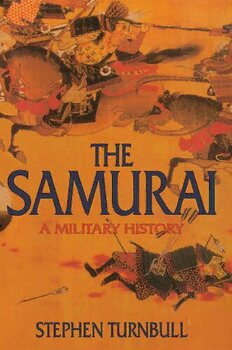
Samurai : a military history PDF
Preview Samurai : a military history
THE SAMURAI AMILITARY HISTORY Cover Illustration The cover illustrationdepictsabattlebetween samuraiofthe Tairaclanand warriormonksoftheKofuku-jiinNaraduringthewinterof1180/81.Thesection, whichshowstheuseofbows,swords,naginata(glaives)andakumade(rake),isfromthe scroll Kasuga Gongen Genki·e(Imperial HouseholdCollection). RaTa-kiri.A warrioTcommitssuicideinthewaythattheritual laterdeveloped, wherebya trustedfriendstands bytodecapitate thevictim. (E.G. Heath Col1ection.) The Samurai A Military History Stephen Turnbull ] I Routledge " Taylor&fraocisG,oup LONDONANDNEWYORK THESAMURAI AMILITARY HISTORY Firstpublished 1977byGeorge Philip(OspreyPublishingLtd) Firstpaperbackedition published 1996by JAPAN LIBRARY Second Impression 1999 Reprinted 2002,2005 byRoutledge 2ParkSquare,MiltonPark,Abingdon,axon, OXl44RN TransferredtoDigital Printing2007 Routledge isan imprintoftheTaylor& FrancisGroup ©1977& 1996StephenTurnbull Allrights reserved.No partofthis publication maybereproducedor transmittedinany form,or byany means withoutpriorpermission inwritingfrom the Publishers, except for the useofshortextractsin criticism. British LibraryCataloguingin PublicationData AeIPcatalogueentryfor this book isavailable from the British Library ISBN 1-873410-38-7 Setin Bembo lZptin Bookman,Slough Publisher'sNote The publisherhas gone togreatlengthstoensurethequalityofthis reprint butpointsoutthat some imperfectionsintheoriginalmay beapparent ForJo, again Thispageintentionallyleftblank Contents Author's Preface IX Foreword xm List offllustrations XVI Conventional periods ofJapanese history XVIll 1. Gods and heroes 1 2. Buddha and Bushi 17 3. The Gempei War 40 4. The fall ofthe house ofTaira 60 5. Their finest hour 76 6. Acts ofloyalty 89 7. The age ofthe Country at War 106 8. Saints and samurai 128 9. Tea and muskets 156 10. Hideyoshi's Korean war 186 11. The final reckoning 224 12. Decline and triumph 252 Appendix 1. Selectedgenealogies 269 Appendix 2. Chronological list ofShoguns 271 Bibliography 273 Index 277 Thispageintentionallyleftblank Author's Preface T wenty years ago, on completing the manuscript for this book, I began the preface with the phrase 'Samurai has become afamiliarword'. The success ofthiswork hasserved to make it allthe more familiar,soIam delighted thatJapan Library are publishing the firstpaperback edition. It is inevitable that, after twenty years and ten more books, I am able to recognize certain errors in TheSamurai that were not apparent to me when I first compiled it.The present edition has enabled me to carry out a complete revision ofthe text, and I have been pleased to discover that such mistakesare minor ones ofdatesand nomenclature.Apart from these corrections, the text has required little editing, but I have taken the opportunity to remove certain unnecessary value judgements, and other conunents that subsequent research has shown to be inaccu rate. For example, in the first edition I described the battles of Kawanakajima as 'gentle jousting' - hardly an adequate expression for the 1561 encounter which had a casualtyrate of 72% on the Uesugi side! I have alsochosen to add no new chapters to the work, asmy subsequent books have done this adequately. Thus the account ofthe Edo Period remains as one chapter, but as this was the 'Age ofPeace' little more isrequired in amilitary history. There isalsolittleabout the samuraiaspatrons ofthe arts.In thesepages the samurai is the fighting man parexcellence. As this book is about people I make no apology for the inclusion ofa large number ofJapanese names. To easethe task ofthe reader, I ignore the infuriating samurai habit ofchanging one's name every few years,and have referred to eachindividual by the name by which he is best known - family name first, given name second - in the old Japanese style. For example Tokugawa Ieyasu (i.e. Ieyasu ofthe house ofTokugawa) began lifeasTakechiyo and became MatsudairaMotonobuatthe ageof fifteen. A year later he became Matsudaira Motoyasu. When he wastwenty he changed hisgiven name to Ieyasu,and at twenty seven discardedhisfamilyname in favour ofTokugawa.Afterhis death he was deified asTo-sho-gii. We shallcallhim Tokugawa Ieyasu throughout. ix
